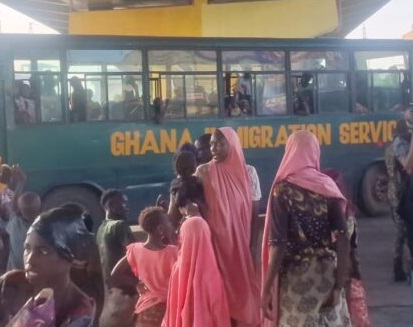The Ghana Immigration Service (GIS) has revealed that a huge majority of foreign street beggars arrested in the ongoing national operation are from Niger.
Out of 2,244 people detained so far, 2,073, more than 92 percent, are Nigeriens. This was confirmed in a press release issued by the GIS on May 19, 2025.
The arrests are part of a special nationwide effort to remove foreign nationals who are begging on the streets of Accra and other major cities. The GIS also listed other detainees: 138 Nigerians, 28 Burkinabes, one Guinean, and one Malian.
“All detainees have gone through profiling and security checks,” the statement noted.
Authorities said the individuals were separated by gender and age to meet international standards of human rights and safety.
Repatriation, the process of sending the detainees back to their home countries, was delayed on Friday due to extended screenings. However, it resumed on Saturday. So far, 925 individuals have been returned, including 819 Nigeriens and 106 Nigerians.
To avoid overcrowding at the holding centre, the GIS has temporarily paused arrests. However, they assured the public that food and medical care are being provided for those still in detention. The GIS Clinic remains on standby for any health needs.
“To avoid congestion at the Holding Centre at the National Headquarters, there has been a temporary hold on arrests. Management wishes to reiterate that the Special Operation is being conducted humanely in cognisance of the rights of all migrants The GIS remains committed to its core values of Professionalism and Respect for Human Rights, and assures the general public of humane handling of affected immigrants,” the GIS emphasized, adding that they remain professional and committed to national security.
Officials said the crackdown will resume soon and called on the public for support in efforts to clear the streets of beggars and tackle criminal networks that may be behind their activities.
As Ghana’s lead agency on migration and border control, the GIS promised to run fair but firm immigration systems that support both national development and public safety.

